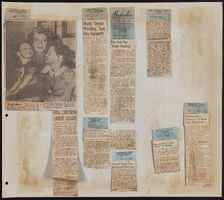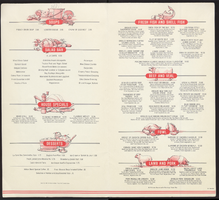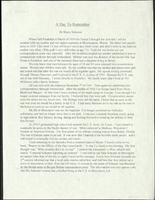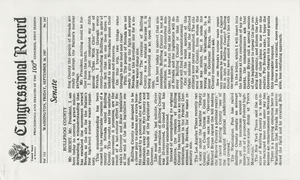Search the Special Collections and Archives Portal
Search Results

"Blacks and the Boulder Dam Project": manuscript draft by Roosevelt Fitzgerald
Date
Archival Collection
Description
From the Roosevelt Fitzgerald Professional Papers (MS-01082) -- Unpublished manuscripts file.
Text

Maria Casas interview, June 12, 2019: transcript
Date
Archival Collection
Description
Interviewed by Maribel Estrada Calderón. Farmersville is described as a small town between, Exeter and Visalia, California populated by Mexican American farm workers. It is in this small town, where UNLV History Professor Maria Raquél Casas spent her childhood raised along with her sisters and brothers. In her interview, Dr. Casas describes how growing up in this small town with her traditional Mexican family influenced the person she is today. While working alongside her family in the fields, Dr. Casas decided that she would strive to obtain an education. Through hard work and constant support from her sister, Dr. Casas attended Fresno State, where she discovered her love for history. Upon completing her undergraduate program, Dr. Casas made the decision to further her education by pursuing a master's at Cornell University. At Cornell, she faced discouraging professors who believed she would not be able to complete the master's program let alone pursue a PhD program. Despite these demoralizing professors, Dr. Casas completed her program and was admitted into University of California Santa Barbara's history program. Dr. Casas never forgot her roots or the significance of her presence in the majority white academic spaces she attended during her academic journey. When she arrived at UNLV, she continued to strive for more Latino representation in both the student population and in the school faculty. During her tenure at UNLV, Dr. Casas has served as an advisor for multiple Latino student organizations including MEChA and SoL. Dr. Casas has witnessed much progress in Latino representation at UNLV, but she believes there is still much work left to be accomplished.
Text

Transcript of interview with Maxine James by Danny DiGiacomo, March 2, 1977
Date
Archival Collection
Description
On March 2, 1977, Danny DiGiacomo interviewed office manager, Maxine James (born September 6th, 1925, in Hayti, Missouri) about her life in Southern Nevada. The two discuss the ease with which people could find jobs in early Las Vegas. The interview provides an overview of James’ occupational history in Las Vegas and concludes with a discussion on the rapid growth of the city in the fifties and sixties.
Text

Louise Kirkwood interview, February 28, 1979: transcript
Date
Archival Collection
Description
On February 28th, 1979, collector Richard Probst interviewed Louise Kirkwood (born December 13th, 1925 in Kemmerer, Wyoming) at her residence in North Las Vegas, Nevada. In the interview, Mrs. Kirkwood discusses moving to Nevada and raising her family. She also discusses recreation in Nevada and her involvement in church activities.
Text

Transcript of interview with Bert Hood by Dennis McBride, June 16, 1998
Date
Archival Collection
Description
Bert Hood is celebrated in Las Vegas's gay history for his ownership of the Red Barn, one of our most famous gay bars. This is another of those serendipitous interviews I've conducted with someone I very much wanted to interview but didn't know how to find. Bert's in Las Vegas from Oklahoma City for just a short while visiting old friends, and I was lucky enough to have found him through Bill Schafer, president of the Southern Nevada Gay and Lesbian Historical Society. I want to thank you, Bert, for donating these two hours of your vacation time to me so I can preserve your stories for the gay community.
Text

Transcript of interview with Rabbi Mel Hecht by Barbara Tabach, March 17, 2016
Date
Archival Collection
Description
In this interview, Hecht talks his life experiences leading him to becoming a rabbi, eventually being a spiritual leader in Las Vegas. He discusses his experiences at Ner Tamid as well as the joy of starting Temple Beth Am, with the support of Morris and Lillian Shenker. Hecht shares stories about working with unions and Ralph Engelstad.
In 1939, Rabbi Mel Hecht was born in Detroit, Michigan. At the age of five, his family moved to Miami, Florida where they had a large, extended Jewish family, complete with relatives who were hazzans and mohels. Soon after moving to Florida, his parents bought a hotel in Hialeah, about 10 miles outside of the city, where Hecht spent the remainder of his childhood. Hecht attended the University of Miami where he earned a Ph.D. in Divinity, and subsequently attended the Hebrew University of Jerusalem. In 1971, he became a rabbi upon graduating from seminary in Cincinnati, Ohio. Three years later, Hecht joined the U.S. Army and served as a race relations officer in Germany. After his service, Hecht returned to Florida (Fort Pierce) to lead his own congregation, and in 1980, he moved to Las Vegas and became the congregational rabbi for Congregation Ner Tamid. Two years later, he left Ner Tamid to start a new congregation?Temple Beth Am?which grew swiftly. In 1982, Hecht also married Michelle (?Micki?). The couple have three children: Melissa Hecht, Karin Toti, and Adam Hecht.
Text




